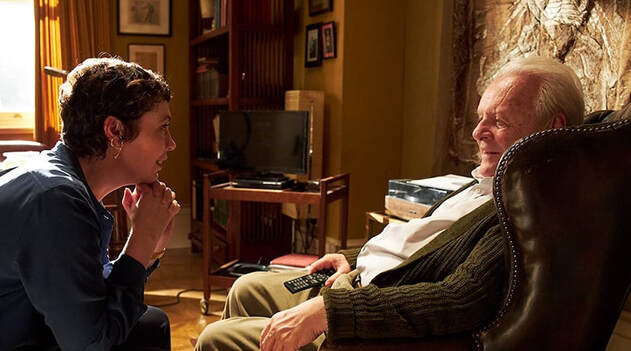|
This is a unique and interesting character study of Anthony, an elderly man in the throes of dementia who is in denial of his situation and resisting help from his daughter, Ann. Adapted from Florian Zeller’s play titled, “Le Pere,” the ornery dad is portrayed brilliantly by Anthony Hopkins. Equally effective is Olivia Coleman as Ann who is both worried about her father and hurt by his harsh edges as he takes out his dire situation on her. Although in recent history there have been several films with an Alzheimer theme, including “Still Alice,” which garnered Julianne Moore an Oscar for the title role, Zeller’s take on the subject seems unique in its approach and execution. For movies, like “Still Alice” and others like it, they are mostly done from the perspective of the family or a family member deeply impacted from the health decline, or from both the perspective of family members and the victim. “The Father” differs is that it is almost entirely from the dementia patient’s point of view as he tries to make sense of what is happening, making for a very trippy and confusing audience viewing … in an interesting way.
For example, in one scene Ann comes to check up on her father in his apartment, and prepare him for his new home caretaker and for the fact that she will be moving to Paris to live with her fiancé. In subsequent scenes Ann is not Ann, as in Olivia Coleman, the apartment is actually Ann’s, not Anthony’s, and Ann is not moving from London to Paris. Which scene is the truth? Throughout and despite the purposeful unreliable narrator aspect of the film, Ann seems to be a genuinely kind daughter who clearly loves her father and is trying to navigate is medical and housing situation seemingly as gingerly as possible. Although she is often frustrated and stressed, she is never angered when provoked. Her fiancé, Paul, played by Rufus Sewell believes her a pushover for her dad and unfairly neglectful of their relationship and his needs. As such, Paul takes advantage when he is alone with Anthony, to let him know his feelings be known. Between the demands of the two men in Ann’s life, it is hard for the audience to not see her as more of a victim than mean-spirited, ailing father. The movie’s best features are the unusual point of view, coupled with these deeply moving performances, including smaller supporting characters portrayed by Olivia Williams (“Rushmore”), Imogen Poohs (“Jane Eyre,” “That Awkward Moment”) and Rufus Sewell (“The Illusionist,” “Judy,” “Victoria” TV series). Although they have little screen time, comparatively, the roles are pivotal and the performances are searing. While the cinematography is rich and beautiful, it is purposefully shot very narrowly, taking place in just two indoor settings. In that, along with one point of view and limited casting, it feels like a play. Unless you have an aversion to play-to-screen adaptations that is not necessarily a detractor, but rather a descriptor. “The Father” has an intimate feel and tells an important story of aging and loss of identity and control for both the victim of this dreaded disease and their caretakers. Director: Florian Zeller Writer: Christopher Hampton Stars: Anthony Hopkins, Olivia Coleman, Olivia Williams, Rufus Swell Country: UK/ France Language: English MPAA Rating: PG-13 Run time: 97 min. Production Page and Trailer: https://www.sonyclassics.com/film/thefather
0 Comments
|
AuthorPaula Farmer. Archives
June 2024
Film |

 RSS Feed
RSS Feed